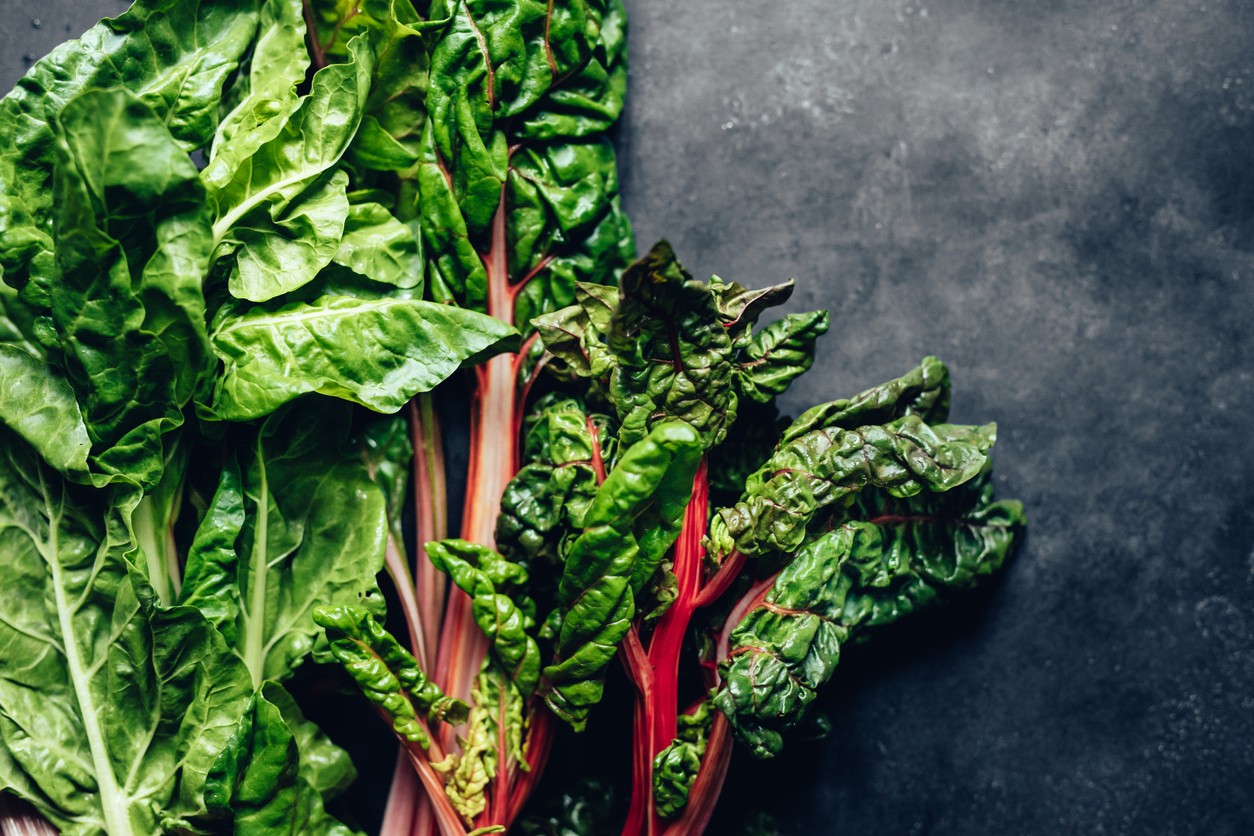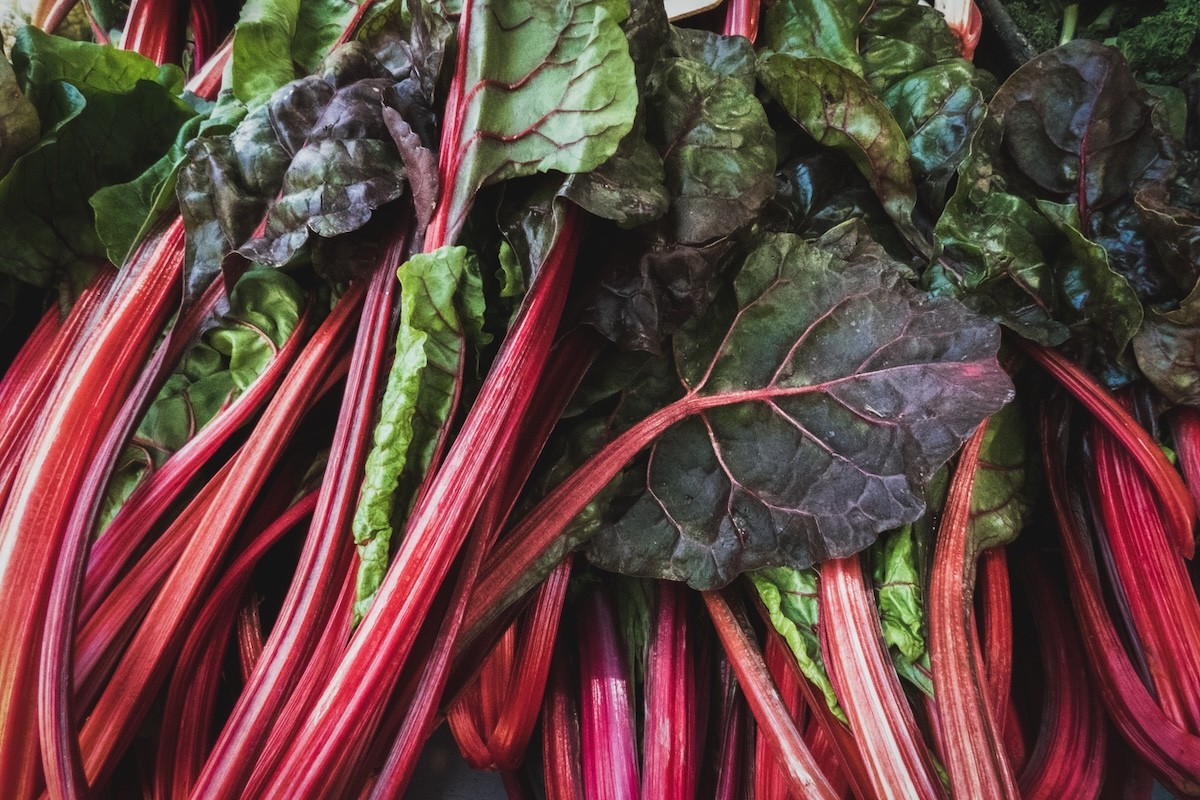9 Reasons You Should Be Eating This Underrated Superfood

It’s no secret that dark leafy green vegetables are one of the best superfoods you can eat. However, if you tend to stick to the most popular types—think kale and spinach—you may be missing out on the unique benefits of another nutritional powerhouse: Swiss chard. Experts say that eating more of the leafy vegetable, which is a descendant of the beet family, has notable heart and gut benefits. However, there are many other crucial benefits to eating Swiss chard. Read on to learn nine surprising health perks of this little-known superfood.
RELATED: This “Powerhouse” Vegetable Is the Healthiest, CDC Says—But You’re Probably Not Eating It.
1
Swiss chard helps with heart health.

“Swiss chard is high in magnesium and potassium, which help regulate blood pressure by balancing sodium levels and relaxing blood vessels,” explains Wade Lightheart, a certified sports nutrition advisor and President of BIOptimizers. “Getting sufficient amounts of these minerals can support cardiovascular health and reduce the risk of hypertension and stroke.”
2
Swiss chard is good for your gut.

Additionally, your gut stands to gain from the ample fiber and prebiotics contained within the leafy greens. “Swiss chard contains soluble and insoluble fiber, which helps promote regular bowel movements, supports gut microbiome diversity, and may reduce bloating,” Lightheart says. “Its fiber content also contributes to satiety which provides extra weight management support.”
3
Swiss chard has unique anti-inflammatory benefits.

Chronic inflammation is widely acknowledged as a root cause of a range of chronic illnesses. Jessica DeLuise, MHS, PA-C, CCMS, founder of The Wellness Kitchenista, says this is one way that Swiss chard offers “potent benefits for overall human health and disease protections.”
By eating this type of leafy green, you may be able to help stave off Type 2 diabetes, cancer, cardiovascular disease, rheumatoid arthritis, autoimmune diseases, and more.
“Unlike many other leafy greens, Swiss chard is rich in betalains, the same pigment compounds in beets. These help support a healthy inflammatory response and oxidative stress,” agrees Lightheart.
4
Swiss chard is an exceptional source of vitamin K.

Vitamin K is essential for maintaining healthy bones and blood health, and Swiss chard is a great source of nutrients.
“Swiss chard is one of the best plant sources of vitamin K, providing over 300 percent of the daily recommended intake per cup of cooked greens,” says Lightheart. “Vitamin K is crucial for blood clotting and supports bone mineralization by helping regulate calcium levels, reducing the risk of osteoporosis and fractures.”
However, DeLuise notes that Vitamin K-rich foods may not be safe for those taking Warfarin, an anticoagulation medication used to prevent blood clots.
Therefore, always speak with your doctor before adding a new food to your daily dietary routine—especially if you are taking medications or supplements that could cause an interaction.
5
Swiss chard aids in blood sugar regulation.

Another key health benefit of eating swiss chard is that its high antioxidant content is known to help improve insulin sensitivity.
“Swiss chard contains syringic acid, a flavonoid shown to help regulate blood sugar by inhibiting certain carbohydrate-digesting enzymes. Its high fiber content also supports healthy blood sugar levels,” Lightheart notes.
6
Swiss chard supports eye health.

Other types of antioxidants found in Swiss chard, known as lutein and zeaxanthin, are beneficial for eye health.
“The deep green leaves of Swiss chard are packed with carotenoids like lutein and zeaxanthin. These carotenoids help protect against age-related macular degeneration and cataracts, making Swiss chard a great food choice for long-term vision support,” notes Lightheart.
Daryl Gioffre, DC, a certified nutritionist, gut health specialist, and the author of Get Off Your Sugar, adds that Swiss chard is full of beta-carotene. This can further enhance ocular health by protecting and moisturizing the eye’s surface, or the cornea.
RELATED: Tomatoes Are the Healthiest Fruit in the World, CDC Says—Here’s Why.
7
Swiss chard may boost your exercise performance.

If you’re looking to get more out of your workout, Lightheart says that Swiss chard makes for a great dietary addition.
“Swiss chard is naturally high in dietary nitrates, which the body converts into nitric oxide—a compound that improves blood flow and oxygen delivery to muscles. This can enhance endurance and reduce fatigue,” he explains.
8
Swiss chard helps combat iron deficiency.

Shutterstock
According to DeLuise, iron is “not something richly found in all vegetables, but is found in chard, spinach, beet greens, dandelion greens, kale, and collard in notable amounts.”
Lightheart agrees that this makes Swiss chard a great food to reach for. “Swiss chard provides a plant-based iron source essential for oxygen transport and preventing anemia. Unlike some other greens, it also contains vitamin C, which enhances the absorption of non-heme iron. This is especially important for vegetarians who only get their iron from plant-based non-heme iron, which is less easily absorbed than animal-based heme iron,” he tells Best Life.
9
Swiss chard is a rich source of vitamins A, C, and E.

Vitamins A, C, and E are often taken together thanks to their powerful antioxidant activity, which can serve a range of functions in the body. In particular, they can help protect the cells from damage by free radicals, promote a healthy immune system, improve dermatological health, and more.
Eating Swiss chard provides a way to increase your levels of all three naturally. A single cup of Swiss chard can provide 44 percent of the recommended daily allowance (RDA) of vitamin A, 18 percent of the RDA of vitamin C, and 4.5 percent of the RDA of vitamin E.